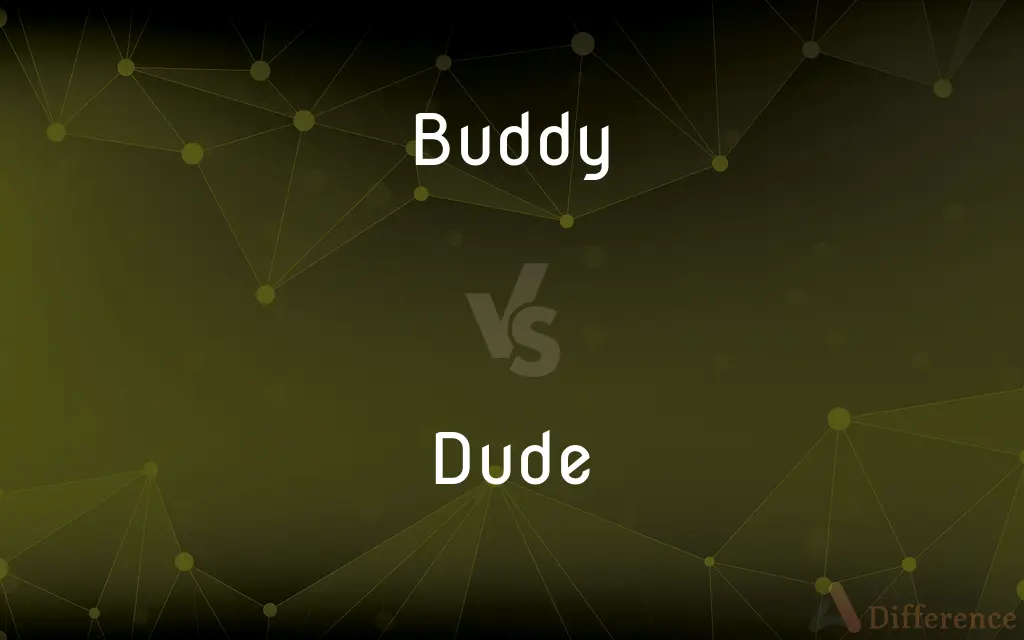Buddy vs. Dude — What's the Difference?
By Fiza Rafique & Urooj Arif — Updated on April 16, 2024
Buddy often implies a closer, more personal relationship, typically used among friends; dude is more casual and can be used more broadly.

Difference Between Buddy and Dude
Table of Contents
ADVERTISEMENT
Key Differences
Buddy is commonly used to refer to a friend or companion, highlighting a sense of camaraderie and personal connection. Whereas, dude is a more informal term that can refer to any male individual, regardless of the personal connection.
In North American English, "buddy" is often employed in friendly contexts and can sometimes convey a kindred spirit or partnership. On the other hand, "dude" originated in the Old West as slang and has evolved into a colloquial term used to address men in a casual or light-hearted manner.
The term buddy can be affectionate and is frequently used among close acquaintances or friends, emphasizing mutual respect or affection. Whereas, dude has a broader usage spectrum and can be employed between strangers as a generic, informal greeting.
When addressing groups, buddy might be used to create a warm, inclusive atmosphere among people who share a bond. In contrast, dude is often used to address groups in a more general and less intimate way.
Usage of buddy tends to be more prevalent in contexts where familiarity and trust are emphasized. Whereas, dude is versatile and can be seen in both casual conversations among friends and in addressing others in informal settings.
ADVERTISEMENT
Comparison Chart
Connotation
Warm, friendly, personal
Casual, general, sometimes impersonal
Common Usage
Among friends, close acquaintances
Broadly used, including strangers
Emotional Connection
Implies a closer emotional bond
Does not necessarily imply an emotional bond
Origin
Middle English “buddy”, possibly from “brother”
American English, likely from “Yankee Doodle”
Typical Contexts
Conversations among friends, familiar settings
Casual or informal settings, group conversations
Compare with Definitions
Buddy
Companion.
He's been my buddy since high school.
Dude
Guy.
That dude over there is wearing a cool jacket.
Buddy
Partner.
I always choose her as my lab buddy.
Dude
Man.
Hey dude, can you help me with this?
Buddy
Friend.
We're travel buddies, planning trips together.
Dude
Person.
There was a dude at the door asking for directions.
Buddy
Ally.
He's my workout buddy at the gym.
Dude
Informal address.
Dude, that was an awesome game!
Buddy
Colleague.
My office buddies and I went for a drink after work.
Dude
Friend (casual).
We've been dudes since college.
Buddy
A good friend; a comrade.
Dude
Dude is English slang (originally American English) for an individual, typically male. From the 1870s to the 1960s, dude primarily meant a person who dressed in an extremely fashionable manner (a dandy) or a conspicuous citified person who was visiting a rural location, a "city slicker".
Buddy
A partner, especially one of a pair or team associated under the buddy system.
Dude
A man; a guy (often as a form of address)
If some dude smacked me, I'd smack him back
Hey dude, what's up?
Buddy
Friend or comrade; chum. Used as a form of familiar address, especially for a man or boy
Watch it, buddy.
Dude
Dress up elaborately
My brother was all duded up in silver and burgundy
Buddy
To associate as a buddy or buddies
Buddied around with the older guys.
Dude
(Informal) An Easterner or city person who vacations on a ranch in the West.
Buddy
A friend or casual acquaintance.
They have been buddies since they were in school.
Dude
(Informal) A man who is very fancy or sharp in dress and demeanor.
Buddy
A partner for a particular activity.
Drinking buddies
Dude
A man; a fellow.
Buddy
An informal and friendly address to a stranger; a friendly (or occasionally antagonistic) placeholder name for a person one does not know.
Hey, buddy, I think you dropped this.
Dude
To dress elaborately or flamboyantly
Got all duded up for the show.
Buddy
(In Maritime English) A person far removed from the conversation.
I found some earphones in the pocket, buddy must have been pissed.
Buddy's loaded. 'Got like three houses.
Dude
Used to express approval, satisfaction, or congratulations.
Buddy
(transitive) To assign a buddy, or partner, to.
Dude
A man, generally a younger man.
So we were at the mall and these two dudes just walk up to us and say "hi".
Buddy
Resembling a bud.
Dude
A term of address for someone, typically a man, particularly when cautioning them or offering advice.
Dude, I'd be careful around the principal; he's having a bad day.
Watch it, dude; you almost knocked me over.
Buddy
A close friend who accompanies his buddies in their activities
Dude
An inexperienced cowboy.
Dude
(slang) A tourist.
Dude
(archaic) A man who is very concerned about his dress and appearance; a dandy, a fop.
Dude
(slang) A term of address, usually for a man, conveying awe, excitement, surprise, annoyance, etc.
Dude! You finally called!
Dude
To address someone as dude.
Dude
To take a vacation in a dude ranch.
Dude
(US) Usually followed by up: to dress up, to wear smart or special clothes.
Dude
A kind of dandy; especially, one characterized by an ultrafashionable style of dress and other affectations.
The social dude who affects English dress and English drawl.
Dude
A man who is much concerned with his dress and appearance
Common Curiosities
What is the origin of "dude"?
Dude originated in the American Old West and was popularized through the phrase "Yankee Doodle".
Can "dude" be used to refer to women?
Historically male-oriented, dude is sometimes used for women in modern, casual speech.
Can "dude" be disrespectful?
When used inappropriately or in formal contexts, dude might be seen as disrespectful.
Is "buddy" used worldwide?
While popular in North American English, buddy is understood and used in various English-speaking regions.
Are there age restrictions for using "buddy"?
Buddy can be used across all ages, often between people who share a specific connection or activity.
Who can be called "dude"?
Dude can refer to any male, often in a casual or friendly manner.
Is "buddy" formal or informal?
Buddy is informal and typically used in casual speech.
Is "dude" specific to American English?
While it originated in American English, dude is widely recognized and used in various English-speaking countries.
What contexts are appropriate for using "buddy"?
Buddy is best used in friendly, familiar contexts among close acquaintances or friends.
Can "dude" be affectionate?
Dude can be affectionate among friends, though it generally lacks the warmth of "buddy".
How do "buddy" and "dude" compare in terms of familiarity?
Buddy implies more familiarity and closeness compared to the more general use of dude.
Can "buddy" be used in professional settings?
Typically, buddy is too informal for professional settings, preferring colleagues or partners instead.
Share Your Discovery

Previous Comparison
Biotin vs. Keratin
Next Comparison
Hit vs. HurtAuthor Spotlight
Written by
Fiza RafiqueFiza Rafique is a skilled content writer at AskDifference.com, where she meticulously refines and enhances written pieces. Drawing from her vast editorial expertise, Fiza ensures clarity, accuracy, and precision in every article. Passionate about language, she continually seeks to elevate the quality of content for readers worldwide.
Co-written by
Urooj ArifUrooj is a skilled content writer at Ask Difference, known for her exceptional ability to simplify complex topics into engaging and informative content. With a passion for research and a flair for clear, concise writing, she consistently delivers articles that resonate with our diverse audience.















































